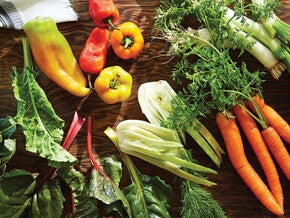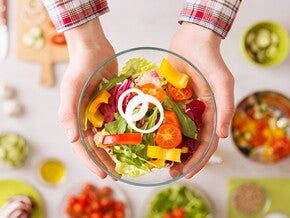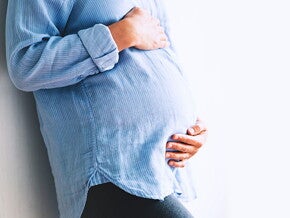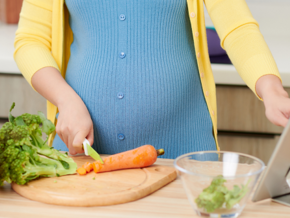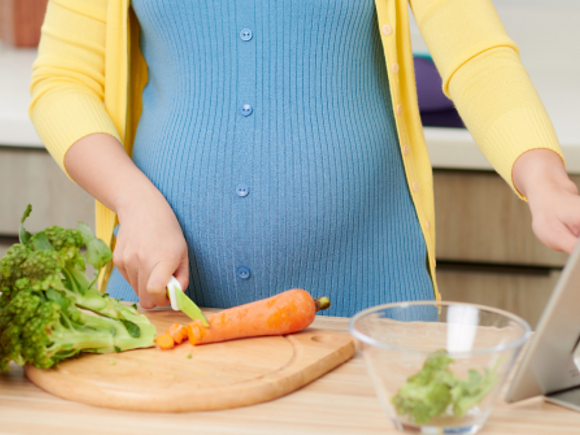
How to Programme Your Child’s Future Health
What to eat during pregnancy to give your child the best start in life.
Food takes on a whole new meaning when you’re a mom-to-be. Not only can it boost your energy levels and sense of wellbeing during the exhausting nine months of pregnancy, but it also directly influences the health of the little one growing inside you. In fact, what you eat — or don’t eat — in the first 100 days of parenting, starting from conception, can affect the extent to which your child may develop chronic conditions such as obesity, diabetes, and cardiovascular disease in the future. This is the concept of “early nutrition and metabolic programming”.
Eat today for their tomorrow
“This idea of early nutrition programming is all about giving your unborn child the best start in life,” says Dr. Marco Turini, PhD, Head of Global Scientific Affairs at Nestlé Nutrition, Switzerland. “During this nine months’ pregnancy, the nutrition and environment your child experiences influence how your child grows and develops before birth, and can programme his growth and health for years to come. This requires special attention to provide adequate nutritional care. That’s why gaining the appropriate amount of weight and choosing foods rich in nutrients are so important for your child’s health.”
Why your weight matters
Childhood obesity is one of the main reasons to control your weight gain and to eat a well-balanced diet during your pregnancy. Excessive weight gain during pregnancy can lead to an approximate 40% increased risk of childhood obesity.
Excessive weight gain during pregnancy can cause a mother to give birth to a high-birth-weight child. This is something we should be worried about because this can impact the child’s weight during his childhood years. Children who are obese are more likely to have a higher risk for adult obesity.
Here are some simple ideas for super-charging your nutrient intake:
EAT… pulses
Eating more pulses, making a lentil salad or adding some chickpeas to your stew at home, for example, will add to your nutrient intake. Pulses include dried beans, peas, lentils, and chickpeas. Along with fish, chicken, red meat, spinach, and dried fruit, pulses also contain iron—a mineral vital for your child’s neural and red blood cell development. They’re also good sources of protein, your child’s building blocks for so many things from enzymes to antibodies.
COOK… vegetables
Eating your vegetables has never been so important. The dark, green leafy types such as kale and spinach are especially rich in folic acid. Vital in the very early weeks, folic acid aids your child’s neural tube develop into their spine and brain. Think about dishing up some carrots, squash, or sweet potatoes with your Sunday lunch too as they all contain vitamin A, which is important for vision and immune health.
DRINK… milk
Milk contains calcium, which helps to grow healthy bones and teeth. During pregnancy, you need up to 1200mg calcium a day, and a glass of milk (240ml) delivers about 300mg of calcium. Skimmed or low-fat milk contains the same amount of calcium as whole milk with fewer calories.
ENJOY… oily fish
Fatty fish, such as salmon and sardines, provides DHA (docosahexaenoic acid), an omega-3 fatty acid that helps support your child’s brain and eye development. Getting enough DHA can be tricky, so if you’re unsure—or you’re not a fish fan—speak to your healthcare provider about a supplement containing DHA.
BOIL… eggs
Whether you like them boiled, scrambled, or poached, eggs are a great source of protein. A building block of your child’s body, protein helps to develop almost everything from collagen to muscles. During pregnancy, your protein needs increase from about 50g to 71g per day. To put that in context of what’s on your plate, a boiled egg has about 7g of protein, a 30g portion of cheese and a 240ml cup of milk each has 7-8g, and an 85g fillet of salmon contains 23g. So, one egg can give you about the same amount of protein as 30g of meat, fish, or cheese, or a glass of milk.
STAY… active
Keeping active by doing some light exercise such as walking, swimming, or yoga may help to keep your weight gain under control. Current guidelines for healthy pregnant women recommend 30 minutes a day of moderate physical activity, most days of the week. Always check with your healthcare provider about exercising during pregnancy.
Sources
Black RE, Victora CG, Walker SP et al. Maternal and child undernutrition and overweight in low-income and middle-income countries. Lancet 2013; 382:427-51.
Committee Opinion. Committee on Obstetric Practice. Physical activity and exercise during pregnancy and the postpartum period. The American College of Obstetricians and Gynecologists 2015; 650.
De Kroon ML. The Terneuzen birth cohort: BMI changes between 2 and 6 years correlate strongest with adult overweight. PLoS One 2010; 5:e9155.
Dodd JM. Dietary and lifestyle advice for pregnant women who are overweight or obese: the LIMIT randomized trial. Ann Nutr Metab 2014; 64:197-202.
IOM (Institute of Medicine) and NRC (National Research Council). Weight Gain During Pregnancy: Reexamining the Guidelines. Washington, D.C.: The National Academies Press, 2009.
Jiang H, Qian X, Lynn H, Fan Y, Jiang H, He F, He G. Can physical activity reduce excessive gestational weight gain? Findings from a Chinese urban pregnant women cohort study. Int J Behav Nutr Phys Act 2012; 9:12. doi: 10.1186/1479-5868-9-12.
Koletzko B, Brands B, Poston L, Godfrey K, Demmelmair H. Early nutrition programming of long-term health. Proc Nutr Soc 2012; 71:371-8.
Langley-Evans S. Nutritional programming of disease: unravelling the mechanism. J Anat 2009; 215:36-51.
Mamun AA, Mannan M, Doi SA. Gestational weight gain in relation to offspring obesity over the life course: a systematic review and bias-adjusted meta-analysis. Obes Rev 2014; 15:338-47.
Nehring I, Lehmann S, von Kries R. Gestational weight gain in accordance to the IOM/NRC criteria and the risk for childhood overweight: A meta-analysis. Pediatr Obes 2012; 8:218-24.
Ong KK, Loos RJ. Rapid infancy weight gain and subsequent obesity: systematic reviews and hopeful suggestions. Acta Paediatr 2006; 95:904-8.
Ramakrishnan U, Grant F, Goldenberg T, Zongrone A, Martorelli R. Effect of women’s nutrition before and during early pregnancy on maternal and infant outcomes: A systematic review. Paediatric Perinat Epidemiol 2012; 26 (Suppl 1):285–301.
Reynolds CM, Gray C, Li M et al. Early life nutrition and energy balance disorders in offspring in later life. Nutrients 2015; 7:8090-11.
Last revised: August, 2016











